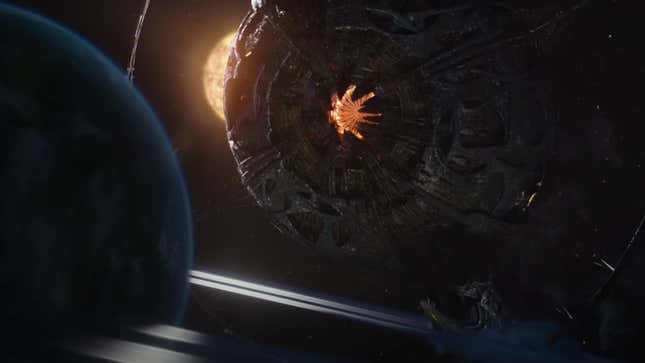
Like a lot of kid-oriented programming from the Reagan era, 1986’s The Transformers: The Movie owes more than a big debt to Star Wars. It features a plucky young hero rising to the occasion (who happens to be a robot from the planet Cybertron), a trusted mentor dying early on, and a main female character who wears Princess Leia-style buns on her head. But the creators of the film outdid themselves when it came to their Death Star analogue: This is a cartoon about things that turn into robots, right? Why not make a Death Star that turns into a robot?
Thus, Unicron was born—and no, it’s not “Unicorn,” despite what the movie’s theme song says (not everyone has the time for a second take). Now, almost 40 years later, he’s coming back for director Steven Caple Jr.’s Transformers: Rise Of The Beasts, with the film’s trailer teasing him as the ultimate “darkness” that threatens “all living things.” There’s even a quick glimpse of a big planet with a mouth, which is exactly how Unicron looked when he first appeared in Transformers: The Movie.
Longtime Transformers fans know the significance of bringing in Unicron, but for anyone who just remembers the Transformers as cool toys or only knows the Michael Bay movies (condolences), this might seem like nothing more than any other hokey “how do we raise the stakes this time?” gimmick. Sort of like Return Of The Jedi’s Death Star II, if you will.
Orson Welles: “I play a planet”
But there is more to Unicron than that. For one thing he … he turns into a giant, planet-sized robot that eats entire worlds and has the unexplained demonic ability to reconstruct dead or dying Transformers into his servants. The second Death Star couldn’t do any of that. It also wasn’t played by legendary actor Orson Welles, who voiced the villain in the original animated movie and then died right after recording his lines. As the story goes (recounted in this Slate piece from 2007), one of the last things he ever did was pithily recount his work on the film by saying, “I play a planet. I menace somebody called Something-Or-Other. Then I’m destroyed.”
How can you not love a character who was brought to life by someone who clearly had nothing but contempt for the whole process and still did a good job? Welles’ Unicron doesn’t say much, and what he does say mostly amounts to “I am evil, I want to destroy everything because I am evil,” but the authority of his natural voice comes through and the editors boost it up to such an over-the-top degree that it really seems like this is how a planet-eating planet would talk. The evil he represents is so far beyond the silly war between two factions of robots that he can barely be bothered to acknowledge it and—whether he meant to do it or not—that comes through in Welles’ performance.
Much like the Death Star, there’s no threat bigger than Unicron except a bigger Unicron, but because he’s technically a guy, that doesn’t work (imagine if the ultimate danger in Return Of The Jedi had been a bigger Darth Vader). If you really dip into Transformers lore and the Cybertron creation myth, Unicron is sort of the Satan figure (with the more benevolent-God robot being named Primus), but acknowledging that requires at least a token acceptance that the Transformers have religion, which might be a bridge too far for … a sane person.
Colman Domingo plays Unicron in Rise Of The Beasts, and the movie is presumably setting him up as the Big Bad for a new era of Transformers films. However, confusingly, Paramount has maintained that this movie is not part of the Transformers series reboot that Bumblebee seemed to tee up, and instead they’re all part of the same canonical timeline. That’s potentially a problem because Transformers: The Last Knight—possibly the most execrable of the largely execrable run of Michael Bay movies—already did a whole Unicron thing. Like most stuff from the Bay movies, it didn’t make much sense and mostly seemed like someone at Hasbro gave him the name “Unicron” and he just did whatever he wanted rather than make any attempt to do right by an established character.
About that big Unicron reveal...
Through some nonsense involving Merlin and Camelot and Bumblebee fighting Nazis in World War II, The Last Knight revealed that Unicron is the Earth, and if he wakes up it will destroy the planet. Which 100 percent does not and can not track with him being a planet-eating planet robot from space in the ’90s when Rise Of The Beasts takes place. Shia LaBeouf’s character in the other movies would’ve said something if the Earth had been replaced by a robot at some point when he was a kid.
So either Rise Of The Beasts is lying in its trailer, or that big reveal in The Last Knight is going to be swept under the rug or retconned. One of those sounds more appealing than the other, but just how Rise Of The Beasts manages to navigate that plot point will say a lot about what Paramount wants to do with The Transformers going forward—at least past the Transformers One animated prequel which, fingers-crossed, will finally explore the dark misdeeds of the corrupt Cybertron Senate.
To The Transformers, bringing in Unicron is like mentioning the Infinity Stones in the Marvel movies. Once you do it, you’ve gotta do it. Assuming they make more of these, there will be some free built-in narrative momentum just from people wondering what will happen with Unicron. That could—could—give future Transformers movies a little more to do beyond giving Michael Bay an outlet for bigger and dumber explosions … assuming Unicron doesn’t win and eat the planet in Rise Of The Beasts!